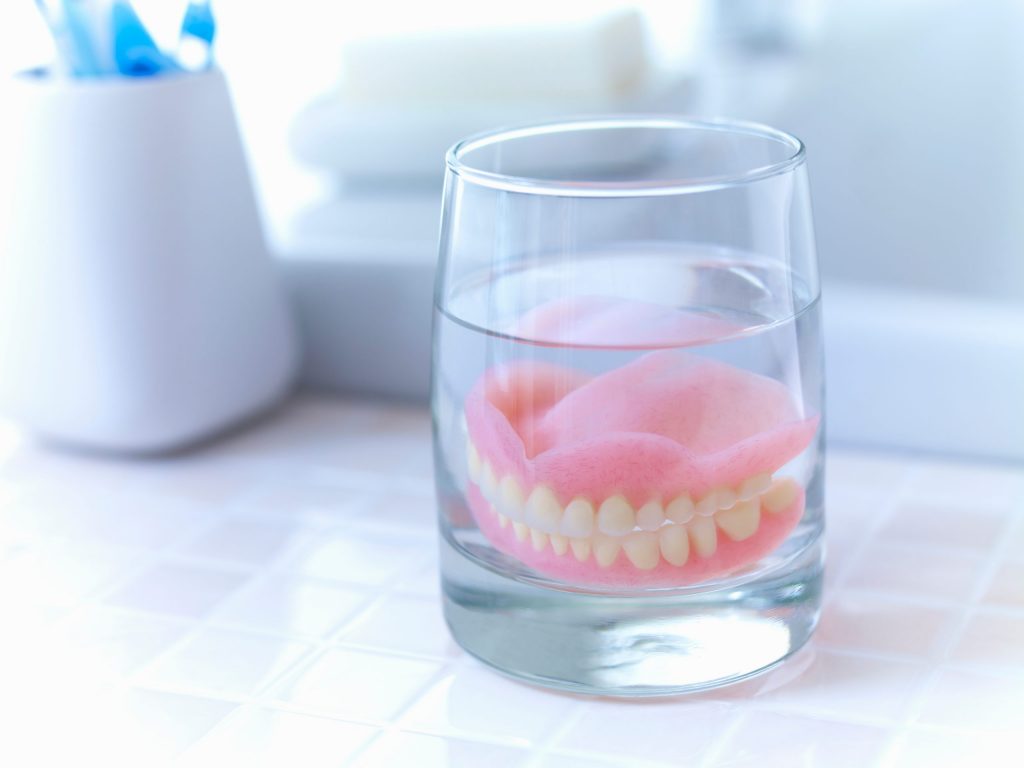If you’re missing teeth, you aren’t alone. Research indicates that as many as 36 million people in the United States are missing all of their teeth. More than 120 million people are missing at least one tooth. Among those people missing teeth, 90% have dentures of some type.

Missing teeth isn’t an issue that anyone should just “live with.” Tooth loss can cause several dental and overall health issues, including:
- Jaw and Bite Misalignment
Missing teeth can cause misalignment in the remaining teeth and jaw, causing pain and discomfort.
- Bone Loss
When a missing tooth isn’t replaced, it can eventually cause bone loss in the jaw.
- Speech, Chewing, and Other Functional Problems
Missing teeth disrupt normal chewing and speaking.
Dentures are an affordable and effective solution for preventing these issues. They also give you an attractive, healthy, and natural-looking smile.
The Types of Dentures Offered at Penn Dental Medicine
At PDM, our graduate student dentists work with patients to find the perfect, affordable dentures to replace chipped, damaged, or missing teeth.
We offer three kinds of affordable dentures:
- Full/Complete Dentures
Designed for individuals without any remaining natural teeth, complete dentures fit along both the top and bottom gum lines. These dentures are removable.
- Partial Dentures
Prosthodontists typically recommend partial dentures for patients who need to replace one or more missing teeth, and their remaining natural teeth are still healthy.
- Fixed/Implant Supported Dentures
Some patients are better suited for (or simply prefer) fixed dentures for tooth replacement, such as bridges, dental implants, or overdentures. These prosthetics involve surgically implanting a titanium implant in the jaw and affixing a tooth (or teeth) to it.
Dental implants are the only type of tooth replacement that functions exactly like natural teeth. The embedded post even encourages continued bone growth in the jaw.
Regardless of the type of dentures you choose, replacing lost teeth has several benefits:
- Helping you to chew and eat food properly
- Improving the way you speak
- Providing a beautiful smile
- Filling out your facial area (improving sagging skin and muscles in the face)
When you visit Penn Dental Medicine for prosthodontics, you have access to highly-trained student prosthodontists and state-of-the-art technology. We use the most innovative tools in the industry to ensure every patient receives comfortable, safe, and lasting tooth replacement.
Living with Your New Dentures
Many dental patients want to know what to expect once they receive their dentures. It’s completely normal to feel some initial discomfort while becoming accustomed to the prosthetic.
To ease that process when you get new dentures:
- Avoid sticky foods and gum
- Eat smaller, soft items
- Chew on both sides of the mouth to encourage balance
- Practice speaking aloud to get used to how dentures adjust your speech patterns
It’s normal to produce more saliva than usual during the initial transition phase of wearing dentures. You should wear dentures as much as possible during the first few hours and days of receiving them, but they need to be taken out at night for cleaning. Avoid making a habit of wearing them for 24 hours or longer.
How to Prolong the Life of Your Dentures
Taking care of your dentures makes wearing them more comfortable, extends their longevity, and means fewer trips to the dentist for adjustments and repairs. Our prosthodontists show patients how to clean and manage their dentures, including tips like:
- Keep Your Dentures Clean
Food particles can get stuck between your dentures and your palate, loosening the grip and irritating your mouth. Use a non-abrasive denture cleanser to remove food and plaque. Be sure to remove any leftover adhesive that can cling to your toothbrush.
Choose a soft-bristled toothbrush to clean your palate, gums, and any natural teeth.
- Use Caution
Non-permanent dentures contain clasps and plastic molding perfectly fitted to your mouth. Avoid breaking or bending these.
- Soak Dentures Overnight
Many dentures lose their shape if they dry out. Water or a mild denture-soaking solution will keep them moist overnight. Ask your dentist or check manufacturer instructions for soaking solution recommendations.
Don’t forget to rinse dentures well before placing them back in your mouth after they’ve been soaking.
- Keep Your Regular Dentist Appointments
Routine dental checkups ensure that your dentures are fitted correctly, preventing discomfort. Always call your dentist if you have any issues with the dentures.
Provided that you follow your Penn Dental Medicine student providers instructions, your dentures will remain functional for 5-10 years. With proper care, dental implants may last a lifetime.
Restore Your Smile with Affordable Dentures from Penn Dental Medicine!
If you’ve been looking for affordable dentures, PDM is the place to visit. Our teaching practice gives patients the benefit of discounted prices without sacrificing the best quality and safety in dental care and services.
In addition to prosthodontic care, we also offer oral medicine, periodontic care, and more! Our team will work with you to see if dental insurance covers your desired procedure, or if dental financing options are needed.
To learn more about dentures and other types of prosthodontics that can restore your smile, download our complimentary ebook, “Prosthodontics: A Comprehensive Guide.” When you’re ready, schedule a prosthodontic consultation, or call us at 215-898-8965 to schedule your appointment.


